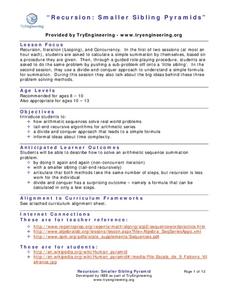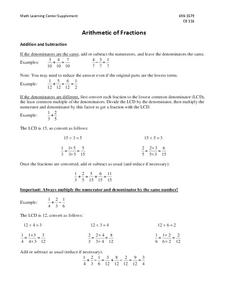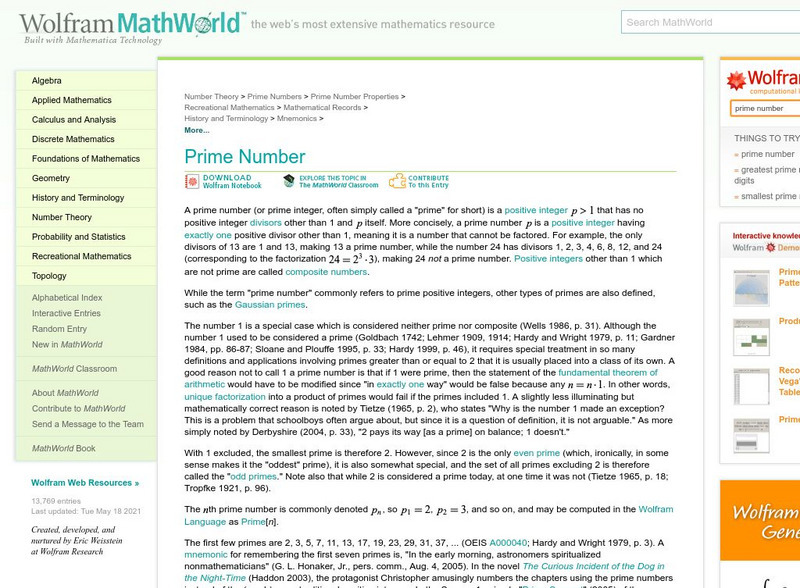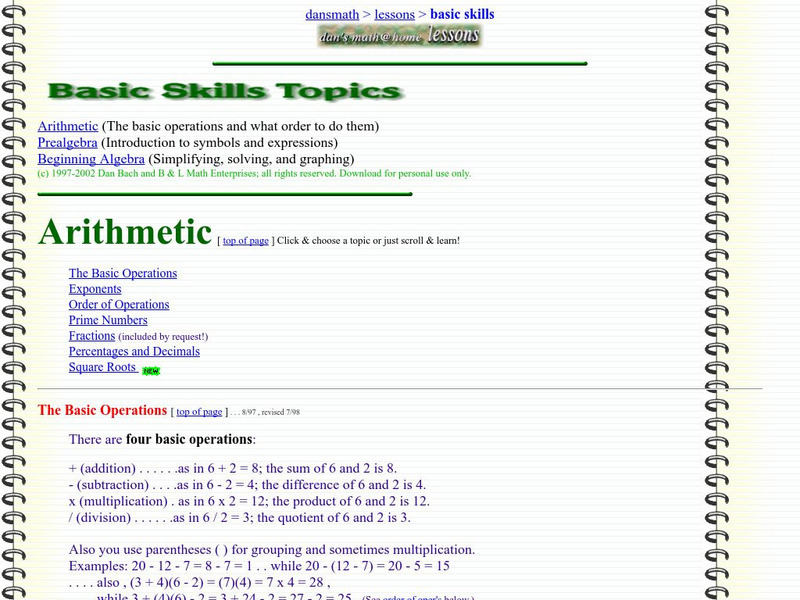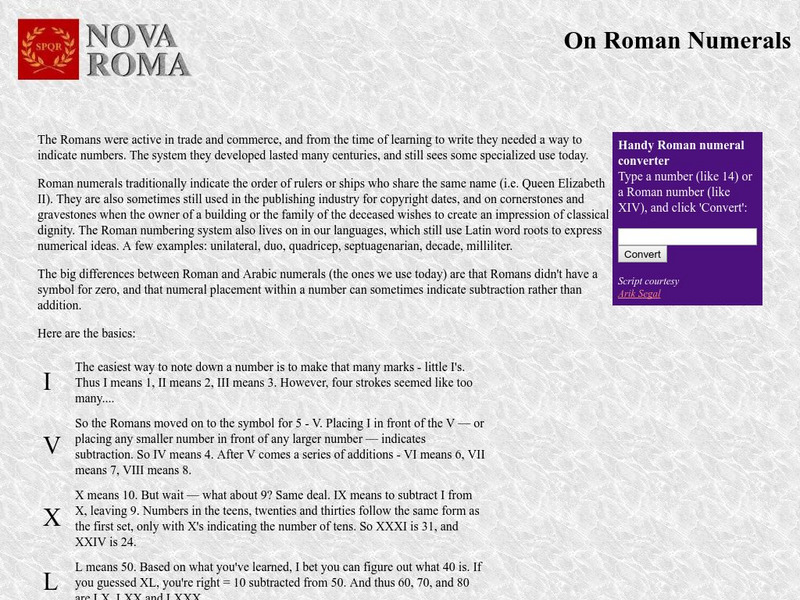Willow Tree
Arithmetic and Geometric Sequences
Old mathematicians never die; they just lose some of their functions. Studying sequences gives scholars an opportunity to use a new notation. Learners write functions to model arithmetic and geometric sequences and use them to find new...
Curated OER
Series Review Sheet
Save an infinite amount of time and enjoy this pre-made series formula guide. Arithmetic and geometric formulas are all included as well as Pascal's Triangle and examples of how the Binomial Theorem expands.
Chapman University
Fundamental Theorems of Mathematics
There are four fundamental theorems of mathematics: arithmetic, algebra, calculus, and linear algebra listed here. Each one is described on this poster or handout. The challenge for a student of math is to figure out why they are...
TryEngineering
Recursion: Smaller Sibling Pyramids
Get siblings to do your work. Scholars learn how to perform summations of arithmetic sequences in an innovative lesson. They use iterations, smaller siblings (tail-end recursion), and the divide-and-conquer approach.
Willow Tree
Fibonacci and Other Sequences
Fibonacci is an interesting sequence that forms some unique patterns. Learners explore sequences that do not have the typical arithmetic and geometric patterns. They identify the pattern and find the next consecutive terms....
Del Mar College
Arithmetic of Fractions
Never forget how to add, subtract, multiply, or divide fractions with a two-page document detailing each operation.
National Institute of Open Schooling
Chemical Arithmetics
Substances with the same empirical and molecular formula must be differentiated by their structural formula. Part two in a series of 36 has pupils using chemical formulas to calculate how much of a compound is present in a given...
TryEngineering
Circuits and Boolean Expressions
Teach basic logic using Boolean operators. Young computer scientists learn about the operators NOT, AND, and OR, and how they can be expressed using Boolean notation, logic gates, or truth tables. Along the way, they learn about half...
McGraw Hill
The Units of the English System
Go from feet to inches to yards and back again with this notes and learning exercise combo resource. Several pages of examples regarding unit conversion of the English system are given, followed by different pages of problems. There is a...
Santa Barbara City College
How to Make a Multiplication Table
Teach children how to make a multiplication table, and they'll be multiplying for life. Following this series of steps, young mathematicians learn to use patterns and the relationships between numbers to create...
National Council of Teachers of Mathematics
The Math Forum: Finding a Term of an Arithmetic Series
This site from the Math Forum contains a common question asked by students learning about arithmetic series which is answered by Dr. Math in a format that is understandable for all ages.
Free Math Help
Free Math Help: Arithmetic Mean
Students learn how to find the arithmetic mean of data. The tutorial consists of a definition and examples with detailed solutions.
Texas A&M University
Greek Numbers and Arithmetic
A brief description of the earliest Greek numberical notation, the Attic system, followed by a more detailed description of the alphabetical system that replaced it.
Wolfram Research
Wolfram Math World: Prime Number
Prime Numbers are defined with a glossary hyperlink to terms used in the definition. Lots of information and examples included. Lists many math-related links. Scroll down to the bottom of the page to see how prime numbers are used in the...
Paul Dawkins
Paul's Online Notes: Complex Numbers Primer
This tutorial reviews complex numbers, notation associated with complex numbers, and the basic operations involving complex numbers. Topics examined are conjugates and moduli, polar form, exponential form, arithmetic of complex numbers,...
Other
Wichita State University: Takakazu Seki Kowa (1642 1708)
This site provides a general biography of Takakazu Seki Kowa, "the arithmetical sage." Content focuses on his known accomplishments. Also includes related links.
Other
Dans Math: Lessons: Basic Skills Topics
If you're looking for a short review of the basic skills needed for arithmetic, prealgebra, and beginning algebra, this could be the site for you. Dan Bach, who teaches mathematics at Diablo Valley College in California, provides brief...
Wyzant
Wyzant: Negative Fractions, Decimals, and Percents
Demonstrates how to perform arithmetic operations with negative fractions, mixed numbers, decimals, and percents. Includes ten practice questions.
Varsity Tutors
Varsity Tutors: Hotmath: Algebra Review: Commutative, Associative, Distributive
Find a quick, concise explanation of the Arithmetic Properties-Associative, Commutative, and Distributive Properties. Examples are given for each property to help you understand how to recognize and apply each property.
Rice University
Hyper Stat Online Statistics Textbook: Arithmetic Mean
This resource gives a definition of a mean and provides a formula for finding a statistical mean.
Smithsonian Institution
National Museum of American History: Slates, Slide Rules and Software
Did you learn to calculate using a 7-foot-long slide rule? Did you learn about the properties of numbers using brightly colored Cuisenaire rods? Ever wonder who invented the graph paper you used in geometry class? Go back to the...
Other
Teachers on the Web: A Maths Dictionary for Kids
On this site from Aussie School House Teachers on the Web, an Australian K-6 teacher defines and illustrates more than 500 mathematical terms. It is a wonderful dictionary featuring clear and often interactive graphics, great colors, and...
Wikimedia
Wikipedia: Las Cuatro Operaciones Basicas
In Spanish. encyclopedic explanations of the four basic operations. Also linked to other information on arithmetic.
Other
Nova Roma: On Roman Numerals
This site from Nova Roma provides great information on Roman Numerals. The text is complete, and a Roman Numeral Calculator is provided to do basic arithmetic. An explanation is provided for each numeral.



